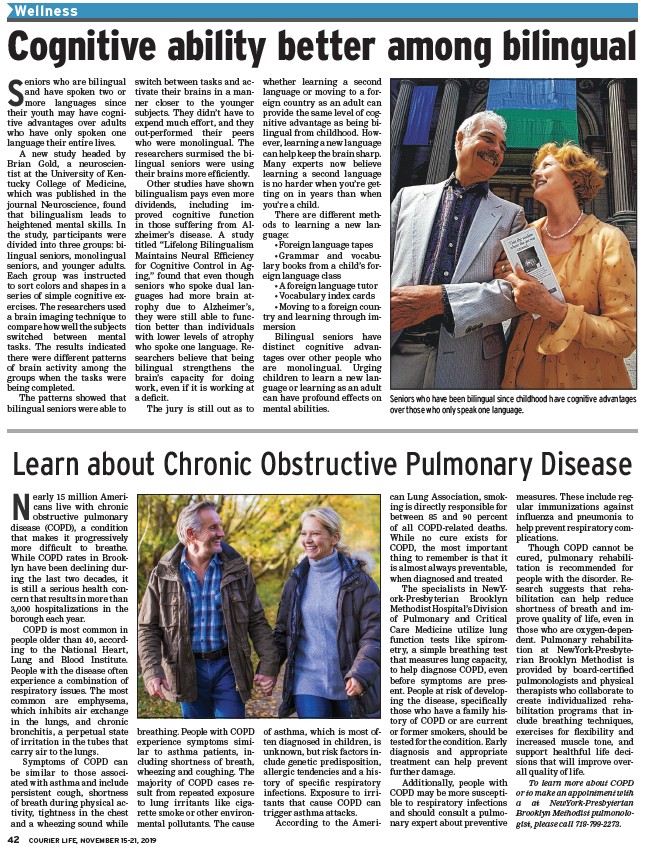
Cognitive ability better among bilingual
Seniors who are bilingual
and have spoken two or
more languages since
their youth may have cognitive
advantages over adults
who have only spoken one
language their entire lives.
A new study headed by
Brian Gold, a neuroscientist
at the University of Kentucky
College of Medicine,
which was published in the
journal Neuroscience, found
that bilingualism leads to
heightened mental skills. In
the study, participants were
divided into three groups: bilingual
seniors, monolingual
seniors, and younger adults.
Each group was instructed
to sort colors and shapes in a
series of simple cognitive exercises.
The researchers used
a brain imaging technique to
compare how well the subjects
switched between mental
tasks. The results indicated
there were different patterns
of brain activity among the
groups when the tasks were
being completed.
The patterns showed that
bilingual seniors were able to
switch between tasks and activate
their brains in a manner
closer to the younger
subjects. They didn’t have to
expend much effort, and they
out-performed their peers
who were monolingual. The
researchers surmised the bilingual
��������������������������������������������������������������������������������������������������
COURIER LIFE, N 42 OVEMBER 15-21, 2019
seniors were using
their brains more effi ciently.
Other studies have shown
bilingualism pays even more
dividends, including improved
cognitive function
in those suffering from Alzheimer’s
disease. A study
titled “Lifelong Bilingualism
Maintains Neural Effi ciency
for Cognitive Control in Aging,”
found that even though
seniors who spoke dual languages
had more brain atrophy
due to Alzheimer’s,
they were still able to function
better than individuals
with lower levels of atrophy
who spoke one language. Researchers
believe that being
bilingual strengthens the
brain’s capacity for doing
work, even if it is working at
a defi cit.
The jury is still out as to
whether learning a second
language or moving to a foreign
country as an adult can
provide the same level of cognitive
advantage as being bilingual
from childhood. However,
learning a new language
can help keep the brain sharp.
Many experts now believe
learning a second language
is no harder when you’re getting
on in years than when
you’re a child.
There are different methods
to learning a new language:
• Foreign language tapes
• Grammar and vocabulary
books from a child’s foreign
language class
• A foreign language tutor
• Vocabulary index cards
• Moving to a foreign country
and learning through immersion
Bilingual seniors have
distinct cognitive advantages
over other people who
are monolingual. Urging
children to learn a new language
or learning as an adult
can have profound effects on
mental abilities.
Wellness
Seniors who have been bilingual since childhood have cognitive advantages
over those who only speak one language.
��early 15 million Americans
live with chronic
obstructive pulmonary
disease (COPD), a condition
that makes it progressively
more difficult to breathe.
While COPD rates in Brooklyn
have been declining during
the last two decades, it
is still a serious health concern
that results in more than
3,000 hospitalizations in the
borough each year.
COPD is most common in
people older than 40, according
to the National Heart,
Lung and Blood Institute.
People with the disease often
experience a combination of
respiratory issues. The most
common are emphysema,
which inhibits air exchange
in the lungs, and chronic
bronchitis, a perpetual state
of irritation in the tubes that
carry air to the lungs.
Symptoms of COPD can
be similar to those associated
with asthma and include
persistent cough, shortness
of breath during physical activity,
tightness in the chest
and a wheezing sound while
breathing. People with COPD
experience symptoms similar
to asthma patients, including
shortness of breath,
wheezing and coughing. The
majority of COPD cases result
from repeated exposure
to lung irritants like cigarette
smoke or other environmental
pollutants. The cause
of asthma, which is most often
diagnosed in children, is
unknown, but risk factors include
genetic predisposition,
allergic tendencies and a history
of specific respiratory
infections. Exposure to irritants
that cause COPD can
trigger asthma attacks.
According to the American
Lung Association, smoking
is directly responsible for
between 85 and 90 percent
of all COPD-related deaths.
While no cure exists for
COPD, the most important
thing to remember is that it
is almost always preventable,
when diagnosed and treated
The specialists in NewYork
Presbyterian Brooklyn
Methodist Hospital’s Division
of Pulmonary and Critical
Care Medicine utilize lung
function tests like spirometry,
a simple breathing test
that measures lung capacity,
to help diagnose COPD, even
before symptoms are present.
People at risk of developing
the disease, specifically
those who have a family history
of COPD or are current
or former smokers, should be
tested for the condition. Early
diagnosis and appropriate
treatment can help prevent
further damage.
Additionally, people with
COPD may be more susceptible
to respiratory infections
and should consult a pulmonary
expert about preventive
measures. These include regular
immunizations against
influenza and pneumonia to
help prevent respiratory complications.
Though COPD cannot be
cured, pulmonary rehabilitation
is recommended for
people with the disorder. Research
suggests that rehabilitation
can help reduce
shortness of breath and improve
quality of life, even in
those who are oxygen-dependent.
Pulmonary rehabilitation
at NewYork-Presbyterian
Brooklyn Methodist is
provided by board-certified
pulmonologists and physical
therapists who collaborate to
create individualized rehabilitation
programs that include
breathing techniques,
exercises for flexibility and
increased muscle tone, and
support healthful life decisions
that will improve overall
quality of life.
To learn more about COPD
or to make an appointment with
a at NewYork-Presbyterian
Brooklyn Methodist pulmonologist,
please call 718-799-2273.